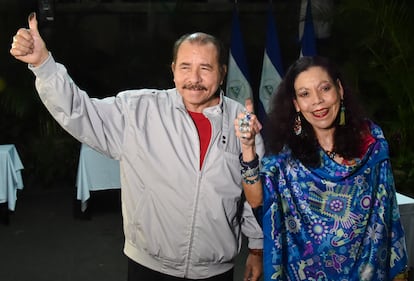The Ortega regime has officially withdrawn Nicaragua from the OAS
The Sandinista apparatus, accused of frequent human rights violations, condemned the organization for aligning with the United States


The government of Daniel Ortega and Rosario Murillo officially announced Nicaragua’s withdrawal from the Organization of American States (OAS). This process began two years ago after they became impatient with frequent allegations by the OAS of human rights and democracy violations in Nicaragua.
“We have officially withdrawn. Nicaragua no longer maintains any relationship with the OAS. Nicaragua, its people, and its government of reconciliation and national unity have distanced themselves from this interventionist organization, which is an instrument of the United States of America’s decadent and hegemonic government,” stated Nicaragua’s Foreign Minister Dennis Moncada on November 20. Moncada cited the alleged “coups d’état” and the “interference” of the OAS in Latin America, beginning in the 1950s with the overthrow of Guatemalan President Jacobo Árbenz. Moncada’s lengthy diatribe then flipped the script on the massive social protests in 2018 that were violently suppressed by the regime’s security forces, calling them an “attempted coup d’état.”
“The OAS has intervened in Nicaragua multiple times, disregarding principles of non-intervention, respect for national sovereignty, and the right of self-determination. These principles are recognized by International Law and outlined in the organization’s founding charter. The OAS displayed biased involvement during the unsuccessful coup attempt in Nicaragua in 2018,” alleged the Ortega-Murillo regime in reference to the social protests that left more than 350 dead amid global repudiation. The OAS issued numerous resolutions condemning the repression and urging Managua to seek a negotiated solution, but its calls were all ignored.
Before resigning from the OAS in November 2021 and initiating the two-year exit protocol, the Sandinista regime not only rejected the 18 OAS resolutions condemning its repression, but also confiscated and occupied the organization’s offices in Managua. This move highlighted the deepening breach between the Ortega-Murillo family and the OAS, especially with Secretary General Luis Almagro, who had been criticized for being overly sympathetic to the co-dictators during diplomatic talks.
“The OAS does not have tools”
In January 2022, Nicaragua barred a high-level OAS delegation from entering the country. This delegation aimed to “establish a positive agenda that includes the important issues of democracy and human rights.” Diplomatic sources confirmed that Ortega and Murillo undermined all efforts by the OAS to foster dialogue. Francisco Mora, the U.S. ambassador to the OAS, stated that the government has no interest in engaging with the international community, including the OAS and the United States. “The OAS does not have the tools to put economic pressure on Nicaragua,” said Mora, but “will continue to exert political and diplomatic pressure” regarding the frequent human rights abuses and attacks on freedom of expression.
As the deadline for Nicaragua’s withdrawal grew near, the OAS issued a resolution arguing that the country’s departure from the multilateral body does not nullify its other legal obligations regarding human rights. The OAS resolution stated that Nicaragua remains obligated to respecting the human rights enumerated in various multilateral agreements and conventions, despite its long history of non-compliance with such agreements under the Ortega-Murillo regime.
Former OAS advisor Guillermo Belt noted that the OAS lacks mechanisms to compel member states to adhere to the obligations outlined in its charter. “The political bodies [the General Assembly and the Permanent Council] had the ability and responsibility to do more, and use their legal authority to exert pressure on the dictatorship and safeguard the rights of the people of Nicaragua,” said Belt, who was an advisor to former Secretary General. Joao Baena Soares in the late 1980s.
According to Arturo McFields, former Nicaraguan ambassador to the OAS, the organization was more influential in the 1980s but is now largely ignored by authoritarian regimes. “The OAS was effective in the past. We witnessed its impact during the Somoza era, where it played a significant role. It was evident in the peace process and the first free, fair and transparent elections in Nicaragua’s history. We also observed their successful intervention to prevent an attempted coup d’état against Enrique Bolaños. However, the OAS has now been overtaken by the so-called 21st-century dictatorships, with Nicaragua being the first to catch the OAS with its pants down,” said McFields. The ex-ambassador, who stepped down from his post in March 2022, also cautioned that Nicaragua has become a model for authoritarians in Central America, further undermining the influence of the OAS.
“The pattern established by Ortega is already being emulated by Alejandro Giammattei in Guatemala. You know how? They both invite the OAS in, sign agreements, and support the organization’s resolutions. But Giammattei never really stopped prosecutors like Consuelo Porras and Rafael Curruchiche, and never really put an end to the repression and arbitrary arrests. That’s the approach people have learned from Ortega,” said McFields, who was stripped of his citizenship shortly after he publicly broke with Ortega. “Once Ortega regained control of the country through force, a change occurred. The government no longer sought to cooperate with the OAS or the United States. There was a clear goal in mind — gradually escalate its authoritarianism. It was a stealthy process. As recently as December 2021, when I was still at the OAS, there were discussions with Almagro to release political prisoners. However, the dictatorship never did anything to formally deny or approve their release.”
Sign up for our weekly newsletter to get more English-language news coverage from EL PAÍS USA Edition
Tu suscripción se está usando en otro dispositivo
¿Quieres añadir otro usuario a tu suscripción?
Si continúas leyendo en este dispositivo, no se podrá leer en el otro.
FlechaTu suscripción se está usando en otro dispositivo y solo puedes acceder a EL PAÍS desde un dispositivo a la vez.
Si quieres compartir tu cuenta, cambia tu suscripción a la modalidad Premium, así podrás añadir otro usuario. Cada uno accederá con su propia cuenta de email, lo que os permitirá personalizar vuestra experiencia en EL PAÍS.
¿Tienes una suscripción de empresa? Accede aquí para contratar más cuentas.
En el caso de no saber quién está usando tu cuenta, te recomendamos cambiar tu contraseña aquí.
Si decides continuar compartiendo tu cuenta, este mensaje se mostrará en tu dispositivo y en el de la otra persona que está usando tu cuenta de forma indefinida, afectando a tu experiencia de lectura. Puedes consultar aquí los términos y condiciones de la suscripción digital.








































